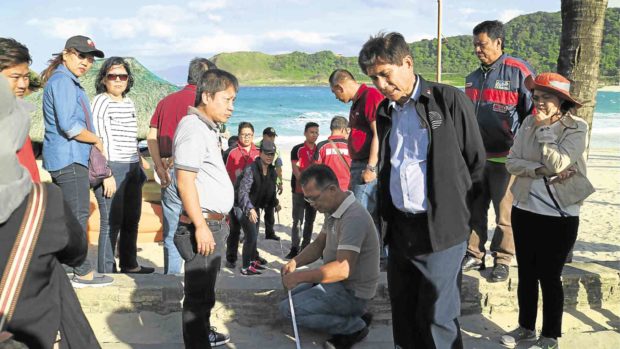After Boracay drive, more resorts clean up

Environment Secretary Roy Cimatu supervises the inspection of a “no-build” zone in Pagudpud, Ilocos Norte. —FLORANTE NICOLAS/CONTRIBUTOR
BAUANG, La Union — The tremors from the crackdown on violators of environmental laws in Boracay and the planned six-month closure of the island are apparently being felt hundreds of kilometers away in popular tourist destinations in the country’s northern tip.
As a result, owners of 300 beach resorts, members of civic groups and local officials in four provinces in Ilocos region agreed late this week to clean up their waterfronts and rectify environmental code violations.
A week earlier, Reynulfo Juan, regional director of the Department of Environment and Natural Resources (DENR), warned businessmen, officials and others engaged in tourism in the region to clean up or face sanctions.
Juan issued the warning here last week during a coastal watch summit, which was called following a visit to Pagudpud town in Ilocos Norte province by Environment Secretary Roy Cimatu, who saw some beach resorts encroaching into the no-build zone—30 meters from the high tide waterline.
Structures within this so-called salvage area in Boracay were ordered demolished.
Article continues after this advertisementJuan said violations similar to those in Boracay and in Pagudpud could be seen on the beaches of San Fabian and Bolinao towns in Pangasinan province.
Article continues after this advertisementEncroachment
“Those who encroached into the salvage zone, those who occupied foreshore areas without permits, all these will have to be addressed,” Juan said.
Bolinao Mayor Arnold Celeste, whose town hosts the popular Patar beach, said the local government had started dismantling illegal structures.
Juan said the northern beach spots were “in a much better situation” than Boracay.
“But of course,” he said, “there are certain local issues that have to be immediately addressed so that they will not worsen.” He did not elaborate.
In Cagayan province, the DENR said it would only allow huts on the beaches of Sta. Ana town amid plans to put up hotels and other concrete structures there.
DENR Cagayan Valley Director Gil Aromin said the government had to stop further construction in Nangaramoan, the 1.2-kilometer strip of white sand beach that has been temporarily closed.
“We cannot allow any more concrete structures to prevent further damage to the environment,” he said. “We should only be putting up huts here.”
Informal settlers
The government is also cracking down on violators of environment, health and building codes in other popular tourist spots.
In a statement on Saturday, the DENR said it had ordered 24 informal settler families and 32 establishments to leave the coasts of El Nido, Palawan province, which is part of the El Nido-Taytay Managed Resource Protected Area.
The statement said these settlers had built houses on stilts above the waters of Corong Corong Bay, disposing their wastes directly into the sea.
Stench
“You can smell the stench in that area,” it quoted Cimatu as saying. “Aside from the fact that they do not have toilets, they are also encroaching on the easement zone, so we hope to move them to a new location soon.”
Earlier this month, the regional DENR office gave 32 resorts and restaurants that had built structures inside the no-build zone one month to remove them.
A task force composed of the DENR, Environmental Management Bureau, Palawan Council for Sustainable Development and the El Nido local government, is checking whether some 200 tourist establishments are complying with environmental laws.